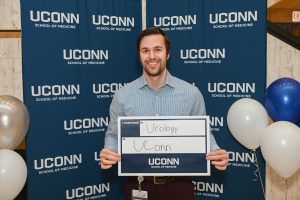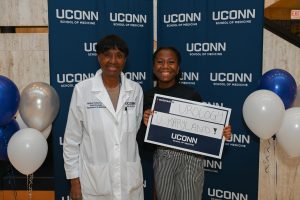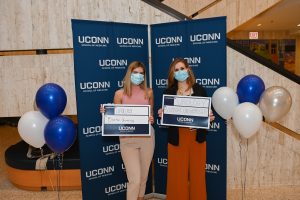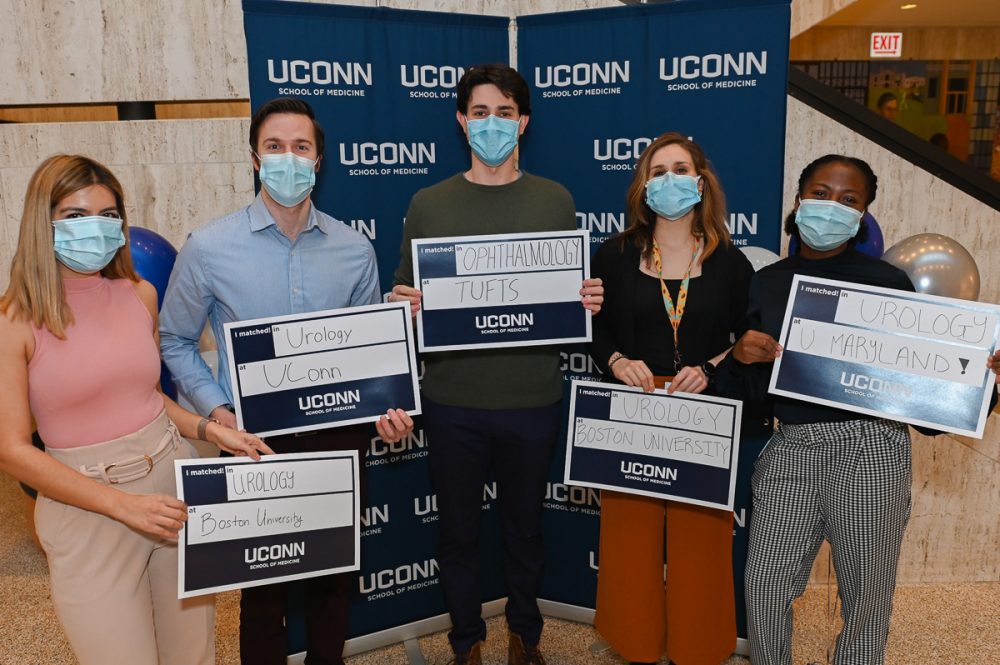Seven fourth-year medical students at UConn School of Medicine participated in the early match process finding out

where they get to spend their advanced residency training over the next several years. The students entering the medical fields of urology, ophthalmology and the military are UConn’s largest early-match class.
“I am thrilled to have matched here at UConn!” shared Ryan Daigle, 27, of Southington, who is entering urology residency training. “I was inspired by the special relationships developed with patients and the fascinating procedures which improve patients’ lives. It is a privilege to join the many physicians from UConn School of Medicine in providing care to the residents of Connecticut.”
Also early-matching to urology but at the University of Maryland is Tijesunimi Oni, 25 from Woodbury, New Jersey. She was part of the Health Career Opportunity Programs (HCOP) at UConn Health and mentored by its leader Dr. Marja Hurley.
“Tijesunimi Oni is making history. She is the first black woman at UConn to match into a urology residency,” Hurley proudly shared during this February’s Black History Month.

“I am very excited to have matched in urology,” Oni says. “I am entering urology because it is a surgical specialty that blends medical and surgical management of patients. In my third year clinical rotations, I realized that I loved being in the OR operating, but I also wanted to be able to form long-term relationships with my patients.”
Oni stresses: “What I have loved most about my time at UConn SOM are the people.”
Future urologists Jessa Sahl, 27 of Avon, and Rhea Sindvani, 25 of Farmington, will both train at Boston University Medical Center.
“It’s very exciting to be matching. We’re doubling up,” said Sindvani.
“It’s definitely a relief to have gone through an early match process,” added Sahl. “I am ecstatic about my match!”
So is Simon Archambault, 27 of Cromwell.
“I am excited to begin to plan my future,” said Archambault who will train in ophthalmology at Tufts/New England Eye Center. “I am the first in my family to graduate from medical school, so being part of UConn’s tradition is a huge honor!”

Archambault said: “Ophthalmology is a surgical subspecialty I can have daily patient encounters, longitudinal patient care, OR time, clinic procedures, and be able to preserve the most beautiful organ in the human body. The school has gone above and beyond to help find me opportunities to accomplish my career goals!”
UConn medical school’s other students participating in the early match process are Xinyue Tan headed into urology residency training at UMass Medical School and Braxten Ramirez who is doing a special military match. He is headed to Madigan Army Medical Center in Washington state.
“Congrats to all our early-matching medical students,” said Dr. Melissa Held, associate dean for medical student affairs. “We are so proud of all of you.”
And the excitement of these early-matchers are a preview of even more excitement to come at the strike of noon on March 18 for National Match Day. Until then their medical school classmates entering advanced training for primary care and other medical specialties will be anxiously awaiting their residency destinies.
The Class of 2022 will graduate this May as part of UConn Health’s 51st graduating class carrying on the now more than 50 year tradition of UConn being the No. 1 producer in Connecticut of future physicians, surgeons and dentists, and a great source of future scientists and public health experts.
As if medical school is not challenging enough, the Class of 2022 entered their medical school clinical rotations at the start of the pandemic.

“The pandemic displayed the importance of remaining flexible in times of uncertainty, which is a lesson I will carry with me in residency,” Daigle said.
“It has been an interesting and unexpected experience to be in medical school during a pandemic,” said Oni. “It has required a lot of patience with patients who may have differing opinions of the pandemic and flexibility with regularly changing guidelines.”
Archambault shared, “I do not think my education has been compromised, and in fact I feel very comfortable working with COVID positive patients!”
Sahl concluded, “I think the hardest part is that I may never know what it was like to practice medicine pre-pandemic.”



